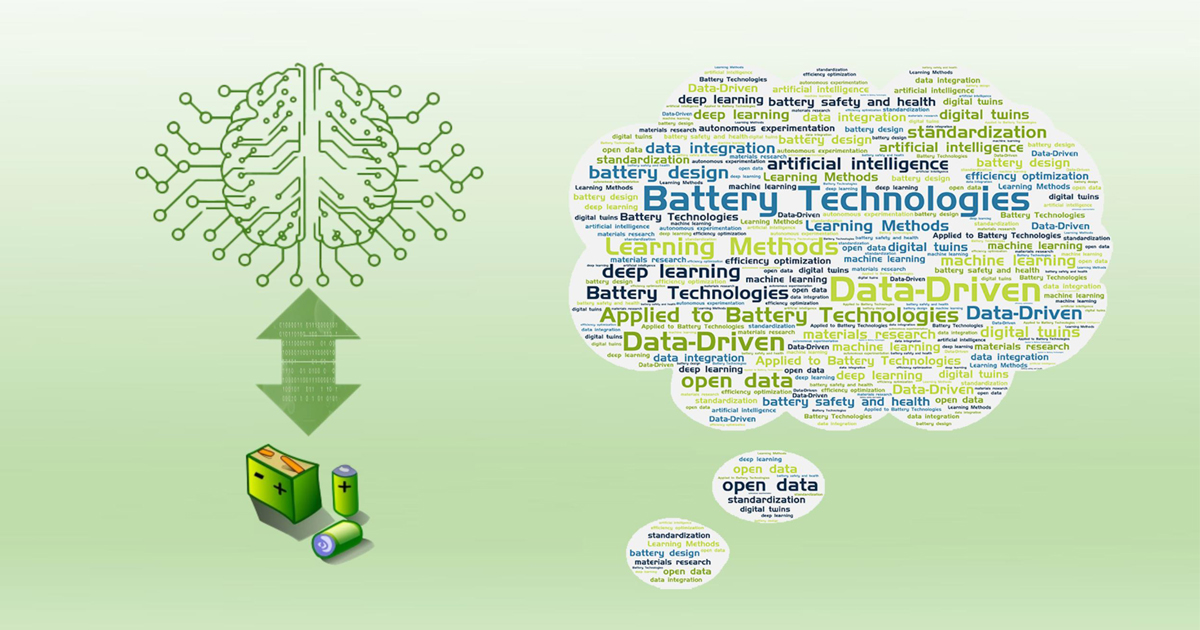Advances in Data-Driven and Learning Methods Applied to Battery Technologies
A special issue of Batteries (ISSN 2313-0105).
Deadline for manuscript submissions: 10 June 2026 | Viewed by 229

Special Issue Editors
Interests: nanomaterials; electrochemical storage; surfaces and interfaces physics; Ab initio calculations; high-throughput calculations
Interests: computational materials science; accelerated discovery of materials; materials for energy; nanotechnologies
Special Issue Information
Dear Colleagues,
This Special Issue explores how advanced data platforms and machine learning are accelerating discoveries and applications in the domain of electrochemical storage. We encourage you to submit your contributions presenting established and emerging frameworks illustrating how artificial intelligence and data integration enables breakthroughs in battery design and efficiency optimization. The purpose of this Special Issue is to provide a comprehensive understanding of how to leverage integrated data solutions to push the boundaries of electrochemical storage science. Contributions addressing critical challenges offering a balanced view of both technical barriers and strategic opportunities in a data-intensive landscape are welcome.
Topics of interest for this Special Issue include, but are not limited to the following:
- Accelerated Materials Discovery and Optimizationto screen and predict properties of new electrode/electrolyte materials. High-throughput DFT + ML pipelines for exploring large compositional spaces.
- Battery modelling and digital twins.Development of physics-informed machine learning models that combine mechanistic knowledge (e.g., electrochemical models) with data-driven learning.
- Autonomous Experimentation and Active Learning. Integration of active learning and Bayesian optimization for guiding autonomous labs in electrode synthesis or electrolyte formulation. Use of robotic platforms and self-driving labs for closed-loop battery experimentation.
- Standardization, Benchmarking, and Open Data.Development of shared datasets (e.g., Battery Archive, BEEP from LBL, BatteryDataExtractor) and open ML benchmarks for reproducible research. Ontologies and metadata standards for battery informatics.
- Multi-Scale and Multi-Modal Data Fusion.Combining electrochemical data, imaging (e.g., X-ray CT), spectroscopy, and sensor data into unified models. Use of graph neural networks and transformers for learning from structured, multi-modal battery data.
- Data platforms for electrochemical storage. Tools and services for data management, advanced analysis, monitoring experiments and simulations.
- Fast-Charging and Safety. Data-driven models for thermal management and internal temperature estimation. Predictive modelling for thermal runaway, short-circuits, and lithium plating during fast charging. Optimization of charging algorithms to balance speed, longevity, and safety.
- Lifecycle and Degradation Analysis. Analysis of large-scale aging data using unsupervised and semi-supervised learning to discover degradation patterns. Clustering and dimensionality reduction techniques to classify cycling behaviours and failure modes.
Dr. Francesco Buonocore
Dr. Massimo Celino
Guest Editors
Manuscript Submission Information
Manuscripts should be submitted online at www.mdpi.com by registering and logging in to this website. Once you are registered, click here to go to the submission form. Manuscripts can be submitted until the deadline. All submissions that pass pre-check are peer-reviewed. Accepted papers will be published continuously in the journal (as soon as accepted) and will be listed together on the special issue website. Research articles, review articles as well as short communications are invited. For planned papers, a title and short abstract (about 100 words) can be sent to the Editorial Office for announcement on this website.
Submitted manuscripts should not have been published previously, nor be under consideration for publication elsewhere (except conference proceedings papers). All manuscripts are thoroughly refereed through a single-blind peer-review process. A guide for authors and other relevant information for submission of manuscripts is available on the Instructions for Authors page. Batteries is an international peer-reviewed open access monthly journal published by MDPI.
Please visit the Instructions for Authors page before submitting a manuscript. The Article Processing Charge (APC) for publication in this open access journal is 2700 CHF (Swiss Francs). Submitted papers should be well formatted and use good English. Authors may use MDPI's English editing service prior to publication or during author revisions.
Keywords
- data platforms
- machine learning
- battery design
- efficiency optimization
- data integration
- artificial intelligence
- battery safety and health
- deep learning
- materials research
- open data
- standardization
- autonomous experimentation
- digital twins
Benefits of Publishing in a Special Issue
- Ease of navigation: Grouping papers by topic helps scholars navigate broad scope journals more efficiently.
- Greater discoverability: Special Issues support the reach and impact of scientific research. Articles in Special Issues are more discoverable and cited more frequently.
- Expansion of research network: Special Issues facilitate connections among authors, fostering scientific collaborations.
- External promotion: Articles in Special Issues are often promoted through the journal's social media, increasing their visibility.
- Reprint: MDPI Books provides the opportunity to republish successful Special Issues in book format, both online and in print.
Further information on MDPI's Special Issue policies can be found here.






